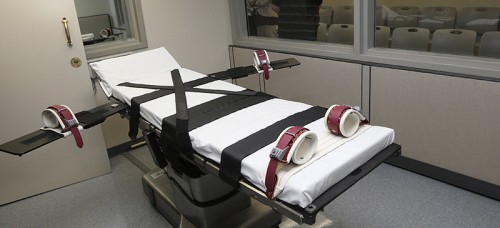
What does the United States have in common with Somalia, North Korea, Sudan, South Sudan, Afghanistan, Iraq and Libya? They’re the seven countries rated most corrupt by Transparency International. Each country still allows the death penalty. In fact, countries that use capital punishment are mostly either poverty-stricken former colonies, recently war-torn, or both, with the notable exception being the U.S. For context, nine of the 10 least corrupt nations have banned the death penalty.
Since 1976, the United States has executed 1,407 people convicted of capital offenses. What constitutes a capital offense varies from state-to-state, but is generally first-degree murder. In Wyoming, burglary and resisting arrest are capital crimes.
Sister Helen Prejean, an advocate against the death penalty, visited DePaul last week. On Tuesday, she gave a short talk and answered questions about her experiences with those on death row, the families of the victims and the prison guards in charge of executions.
“When I became a nun, I never dreamed I’d end up on death row,” she said.
From there, she told the story of how she accompanied one murderer to his death and found forgiveness in the family of his victims. It’s the story made famous in her book “Dead Man Walking” and subsequent movie of the same name.
Sister Prejean’s experiences informed her thoughtful answers to questions about policy, the justice system and racial bias. Her words reinforce the reasons that the death penalty should be abolished nationwide.
One problem with the death penalty is that our justice system is an imperfect one. Evidence is suppressed, judges are fallible and juries are only human. Since 1973, 140 people on death row have been found innocent in the same courts that judged them guilty. A system that kills the innocent along with the guilty is not one I can support.
“I have accompanied six human beings to executions,” Prejean said. Of those, she believes that two were innocent.
Another flaw with the American justice system is its racial bias. According to the Death Penalty Information Center (DPIC), 42 percent of death row inmates are black. Black Americans make up only 13 percent of the overall population.
It is not just the race of the defendant that skews the sentence, however. The same study also shows that if the victim of the crime was white, the defendant is much more likely to be sentenced to die. These facts are unsurprising but unacceptable.
Moreover, defining an act that warrants the punishment of death is impossible. In 2012, President Obama attempted to do so.
“I believe there are some crimes — mass murder, the rape and murder of a child — so heinous, so beyond the pale, that the community is justified in expressing the full measure of its outrage by meting out the ultimate punishment,” Obama said.
Certainly, we can understand the rage of a community. Our blood boils when we see someone take advantage of a child in such an unspeakable way. But to say that a community’s outrage is the persuading factor in the decision of the court to kill another human defies the purpose of the justice system and succumbs to mob mentality.
The communal outrage in both Massachusetts and Colorado, where two young men await sentencing for mass murders, may lead Dzhokhar Tsarnaev, one of the Boston Marathon bombers, and James Holmes, who shot and killed 12 people in an Aurora cinema to death row.
Another reason to abolish the death penalty is that it is cheaper for taxpayers. According to the DPIC, it costs $90,000 more per inmate where the death penalty is sought than those where life in prison is the sentence. The California Department of Corrections lists 754 death row inmates, meaning California would save $67 million by abolishing the death penalty. “What’s a humane way to kill a person, really?” Prejean asked.
There isn’t one. In the past year alone, there have been several botched executions that certainly constitute “cruel and unusual punishment.” Michael Wilson was executed last year in Oklahoma. His last words were, “I feel my whole body burning.” Also in Oklahoma, Clayton Lockett’s now infamous execution took 30 minutes; he died of a heart attack on the table.
Finally, there is the emotional toll on the families of the victims. When the death penalty is sought, the court cases, appeals and media coverage become an unremitting ordeal for loved ones who want to begin the healing process.
Billy Smith watched his father’s killer die. He told the Washington Post that it was hollow and anticlimactic after years of waiting. Other families expressed similar feelings. It turns out that “eye for an eye” justice is less satisfying than it sounds.


Arafat / May 4, 2015 at 10:32 am
“What does the United States have in common with Somalia, North Korea, Sudan, South Sudan, Afghanistan, Iraq and Libya?”
Nothing. Our judicial system is imperfect and so is man. We are all flawed, Emily, even you are.
But, we in America have a Constitution and a Bill of Rights that are the moral inverse of anything one can find in any of the Muslim countries you mention (and, of course, NK too).
Muslims countries embrace values based on a religion of brutality founded by a brutal prophet. In Muslim countries politics, religion, laws, social mores are all based on Islam’s values, i.e., largely dominated by repression and disdain for others.
We share as much with these countries and their values as we do with the Hutsi’s of Rawanda or the man on the moon.
I do find your insinuation that America should be categorized with these evil-loving countries offensive and a gross manipulation of the reality.